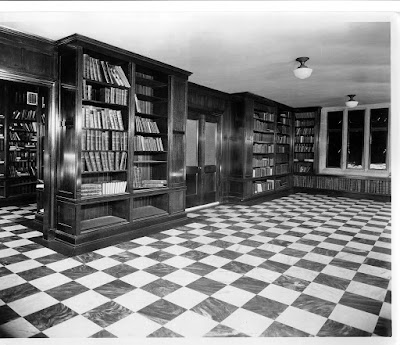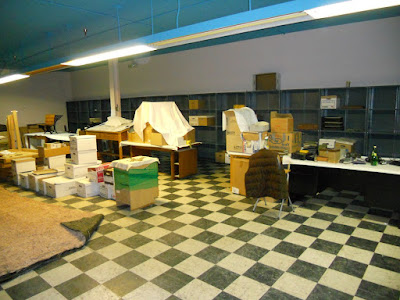Friday, December 2, 2011
George Dunne's Kings Pawn
The author's inscribed copy to his company was recovered today in the High School archives. It will remain with The Fathers Library.
Thursday, November 17, 2011
Saturday, November 12, 2011
Thursday, November 10, 2011
Thursday, November 3, 2011
Tuesday, November 1, 2011
Friday, October 28, 2011
Monday, October 24, 2011
The 6th annual archives bazaar was off the chain this year.
More pics coming but

here's a collection of archivists from CSUN.
Tuesday, October 4, 2011
Making history
"Loyola ... it hasn't always been a high school; it hasn't always been taught by Jesuits; it hasn't always been at 1901 Venice Blvd.; and it hasn't always been called Loyola.
Loyola isn't a name or a place or a particular group of teachers. Loyola is a continuum, a skein of ides, values and visions that have withstood the test of time precisely because it has continuously and harmoniously adapted and grown with time. Loyola is living proof of the paradox that the more something changes the more it remains the same.
Loyola isn't a name or a place or a particular group of teachers. Loyola is a continuum, a skein of ides, values and visions that have withstood the test of time precisely because it has continuously and harmoniously adapted and grown with time. Loyola is living proof of the paradox that the more something changes the more it remains the same.
Monday, August 15, 2011
The High School Archives of Loyola (Los Angeles): a draft bibliography
The frosh reading list
The Man from the Cave by Colin Fletcher: Alfred A. Knopf, New York, 1982
This story of an unusual American life rescued from anonymity through the casual discovery of a few mysterious objects in an old steamer trunk is a wonderful telling of the thrill of discovery in intellectual pursuit. This should be the most accessible book on this list for the young reader.
A Modern Archives Reader: Basic Readings on Archival Theory and Practice: edited by Maygene F. Daniels and Timothy Welch: National Archives and Records Service, Washington, D.C., 1984
Restoring Order: The Ecole des Chartes and the Organization of Archives and Libraries in France, 1820-1870 by Lara Jennifer Moore: Litwin Books, LLC, Duluth, 2008
“According to most histories of French archives and libraries, the nineteenth century was a period of slow but steady recovery from the trauma of the revolutionary era. In contrast, Moore argues that the organization of archives and libraries in nineteenth-century France was neither steady nor progressive. By following the development of the Ecole des Chartes, the state school for archivists and librarians, Moore shows that conceptions of "order" changed dramatically from one decade to the next. More important, she argues that these changing notions of "order" were directly connected to contemporary shifts in state politics. Since each new political regime had its own conceptions of both national history and public knowledge, each one worked to "restore order" in a different way.”, --- Amazon.com, 2011
"The French Revolution and the Materiality of the Modern Archive" by Ralph Kingston: Libraries and the Cultural Record 46 No. 1, Austin, 2011
“Historians of vandalism and conservation during the French Revolution have treated the archive as an idea, an expression of modern political culture, and have largely ignored its material history. When revolutionaries "attacked" Old Regime depots, however, they were spurred on by necessity: locating valuable property titles, or paper for use as gunpowder funnels. Moreover, it was only when limited space in ministry buildings forced New Regime administrators to discard documents from their own holdings that archivists embraced historical conservation. Through ministerial deposits in the Archives nationales, the archive as a lieu de mémoire—legitimized by a respect des fonds—took shape in nineteenth-century France.”, --- University of Texas, 2011
That Noble Dream: The “Objectivity Question” and the American Historical Profession by Peter Novick, Cambridge University Press
Additional works
“A History of Christian Thought” by Paul Tillich: self-published lecture notes; Cambridge, Mass. 1956
Jesuit High Schools Revisited by Joseph H. Fichter: Jesuit Education Association, Washington D.C., 1969
A Bibliographical Essay on the History of Society of Jesus by William V. Bangert, S.J.: The Institute of Jesuit Sources, St. Louis, 1976
Saint, Site and Sacred Strategy: Ignatius, Rome and Jesuit Urbanism edited by Thomas M. Lucas, S.J.: Biblioteca Apostolica Vaticana, Rome, 1990
Saturday, August 13, 2011
Monday, July 18, 2011
Loyola High School's planned archives facilities, Los Angeles, 2010
As Loyola began to gather it's historic records, this warehouse would be simultaneously cleared of 7500 square feet of surplus furnishings and furniture.
Sunday, July 17, 2011
Saturday, July 16, 2011
Brother McDermott's camera equipment
An early challenge at the new High School Archives of Loyola would be to effectively manage Brother McDermott's extensive camera equipment. Included in this hardware collection was a 70mm camera and mountings for aerial photography, developing chemical and baths. In the end High donated the collection to the USC film school.
An archives interior
In preparation for the sesquicentennial celebration of one of Los Angeles most venerable institutions, Loyola High School is gathering the historical record in a designated facility
Wednesday, July 13, 2011
In Los Angeles, a high school archives at Loyola is slowly getting underway.
It is easy to miss but not hard to find smack in the middle of LA. This place is slowly being worked into the beginning location of the Loyola High School Archives.
Saturday, April 16, 2011
Subscribe to:
Posts (Atom)





![[MariaRasputinYouth.jpg]](https://blogger.googleusercontent.com/img/b/R29vZ2xl/AVvXsEhUSIMGfsF60gItpQQvFHIfvR5yVNyARX5jJrOvozJLPE_os8aFzcttlXRtv-eT1PkCvCUJiemLyJyVTQCZG25SiTjl5Y2QJ7ZDiV19v5uSf-g7oT1hA3yagop-YIyLGTktwuSuAA4PeC0/s1600/MariaRasputinYouth.jpg)










